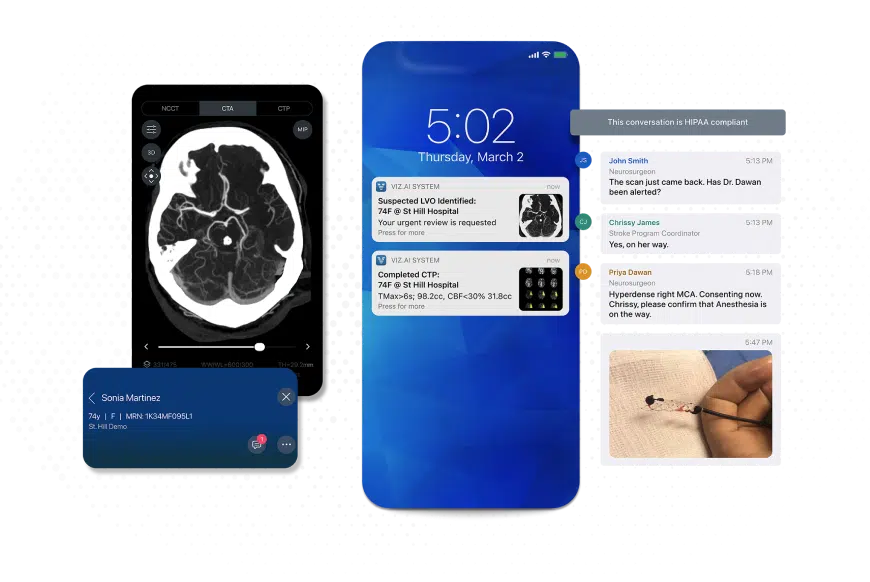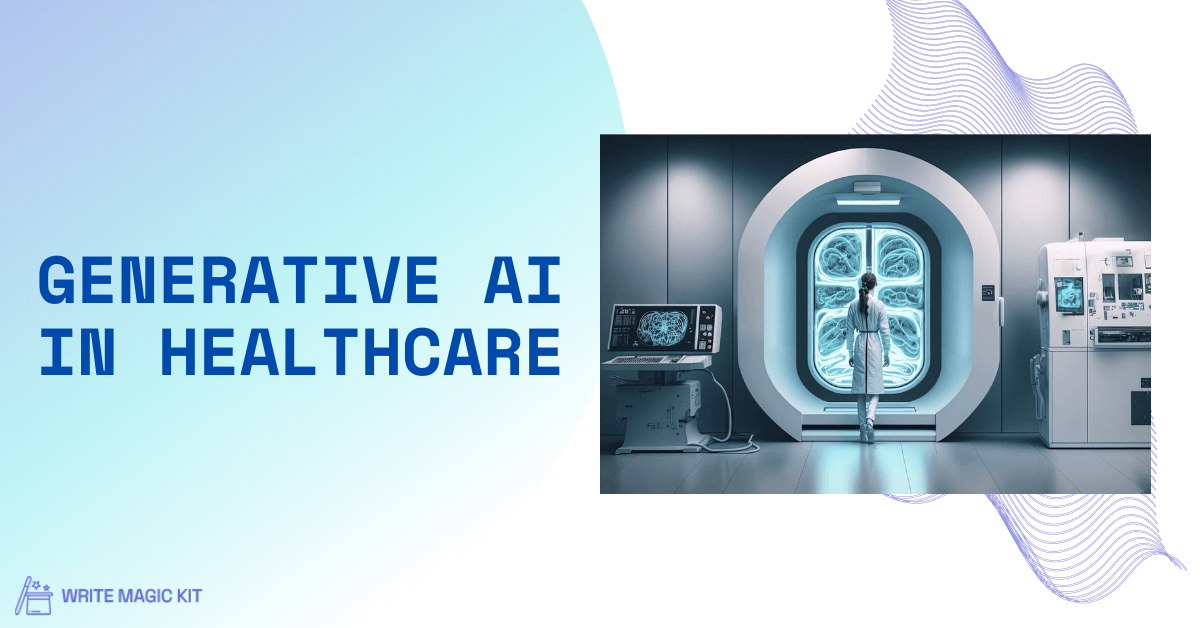Generative artificial intelligence (AI) is rapidly transforming the healthcare landscape, moving beyond traditional data analysis to create entirely new forms of medical information. By harnessing the power of vast medical datasets, generative AI models are unlocking groundbreaking applications that have the potential to revolutionize patient care, streamline workflows, and accelerate medical discovery. This article dives deep into the exciting world of generative AI in healthcare, exploring its diverse applications, potential benefits, and the considerations for responsible implementation.
Empowering Personalized Medicine
- Precision Diagnostics: Generative AI algorithms can analyze a patient’s unique genetic makeup, medical history, and lifestyle factors to create a comprehensive picture of their health. This allows for the development of highly personalized diagnostic tools that can identify diseases at earlier stages and with greater accuracy.
- Predictive Analytics: Generative AI models can analyze vast datasets of medical information to predict an individual’s risk of developing certain diseases. This empowers preventive healthcare by allowing doctors to intervene early and tailor preventative measures to each patient’s specific needs.
- Treatment Optimization: Generative AI can analyze a patient’s unique response to different treatment options, allowing healthcare providers to personalize treatment plans for maximum effectiveness and reduced side effects. This approach to personalized medicine holds immense promise for improving patient outcomes in a wide range of conditions.
Streamlining Healthcare Workflows
- Automated Report Generation: Generative AI can automate the generation of medical reports, including radiology reports, pathology reports, and discharge summaries. By analyzing medical images, patient data, and clinician notes, AI can create clear, concise, and standardized reports, freeing up valuable time for doctors and nurses and reducing human error.
- Drug Discovery and Development: The traditional drug discovery process is lengthy and expensive. Generative AI can significantly accelerate this process by simulating complex molecular interactions and predicting potential drug candidates with desired properties. This can lead to the development of new and more effective treatments for a wide range of diseases.
- Medical Imaging Analysis: Generative AI algorithms can analyze medical scans, such as X-rays, MRIs, and CT scans, with exceptional accuracy and speed. This can assist radiologists in identifying abnormalities, differentiating between benign and malignant lesions, and making diagnoses more efficiently.
Read More: AI Coffee Makers: Transforming the Coffee Industry Landscape
Beyond Diagnosis and Treatment
- Generative AI for Drug Repurposing: This exciting application involves using generative AI to identify existing drugs that may be effective in treating new diseases. By analyzing the molecular structure and function of existing drugs, AI can predict their potential effectiveness against new targets, leading to faster and more cost-effective drug development.
- Patient Education and Engagement: Generative AI-powered chatbots can provide patients with personalized educational materials and answer their questions in a clear and informative way. This can improve patient understanding of their conditions, treatment options, and overall health, leading to better treatment adherence and improved health outcomes.
Challenges and Considerations
While generative AI offers a plethora of benefits for healthcare, it’s crucial to address certain challenges:
- Data Privacy and Security: As generative AI relies heavily on patient data, ensuring the highest standards of data privacy and security is paramount. Robust data governance practices are essential for building trust and ensuring the ethical use of generative AI in healthcare.
- Algorithmic Bias: Generative AI models are trained on existing datasets, which may contain inherent biases. Mitigating algorithmic bias requires careful data selection, ongoing monitoring of AI outputs, and the development of fairness metrics for AI algorithms in healthcare.
- Regulatory Landscape: Regulatory frameworks need to evolve to accommodate the rapidly changing nature of generative AI in healthcare. Clear and adaptable regulations will ensure responsible innovation, public trust, and the ethical application of generative AI technologies.
Top 5 Medical AI Tools Revolutionizing Healthcare in 2024
The field of medical AI is rapidly evolving, with new tools emerging constantly. Here’s a glimpse into 5 of the most impactful medical AI tools making waves in 2024:
1. Enlitic: Illuminating Diagnostics with AI
Enlitic stands out for its comprehensive AI platform that analyzes medical images and clinical data. This powerful tool empowers healthcare providers with:
- Advanced Diagnostic Support: Enlitic’s AI algorithms can analyze vast amounts of medical data to identify potential abnormalities in scans and flag them for further investigation. This can significantly improve diagnostic accuracy and streamline workflows for radiologists and other clinicians.
- Clinical Decision Support: By analyzing a patient’s medical history, current condition, and available treatment options, Enlitic’s AI can provide real-time, evidence-based recommendations to support informed clinical decision-making.
2. PathAI: The Microscope’s AI Partner
PathAI focuses on developing AI-powered tools specifically for pathology applications. Their innovative solutions are transforming the field by:
- Augmented Pathology Workflows: PathAI’s AI algorithms can analyze tissue samples alongside pathologists, highlighting potential areas of concern and aiding in more efficient and accurate diagnoses.
- Personalized Cancer Treatment: By analyzing the genetic makeup of tumors, PathAI’s AI can help identify the most effective treatment options for individual cancer patients, paving the way for more personalized cancer care.
3. Viz.ai: Streamlining Care Coordination with AI
Viz.ai tackles a crucial challenge in healthcare: ensuring timely and efficient care coordination. Their AI platform excels in:

- Early Detection of Critical Conditions: Viz.ai’s AI can analyze medical scans, like CT scans, to identify signs of stroke or pulmonary embolism (blood clots in the lungs). This allows for faster diagnosis and intervention, potentially saving lives and improving patient outcomes.
- Improved Care Communication: The platform facilitates seamless communication between healthcare providers by automatically highlighting critical findings on scans and flagging them for urgent attention. This can significantly reduce delays in treatment.
4. Corti.AI: Revolutionizing Virtual Assistants for Healthcare
Corti.AI takes virtual assistants in healthcare to a whole new level. This AI-powered platform goes beyond scheduling appointments by offering:
.jpg)
- Personalized Patient Support: Corti.AI chatbots can engage with patients, answer their questions about their conditions and medications, and provide educational resources.
- Chronic Disease Management: This AI Co-Pilot for Healthcare platform can be used to monitor patients with chronic conditions, reminding them to take medications, track symptoms, and even offer basic mental health support through AI-powered chat interactions.
5. BenevolentAI: Accelerating Drug Discovery with Generative AI
BenevolentAI takes a unique approach to drug discovery using generative AI. Their cutting-edge platform disrupts the traditional process by:
- Generative Molecule Design: BenevolentAI’s AI can create entirely new molecules with desired properties, accelerating the identification of potential drug candidates for various diseases.
- Drug Repurposing: The platform can analyze existing drugs and predict their potential effectiveness against new diseases, leading to faster and more cost-effective drug development.
Read More: The Rise of Amazon Gen AI in E-Commerce Success
The Future of Generative AI in Healthcare
The potential of generative AI in healthcare is vast and constantly evolving. As research and development progress, we can expect even more transformative applications to emerge. From developing personalized treatment plans and streamlining drug discovery to empowering preventive care and improving patient education, generative AI holds the key to a future of improved healthcare outcomes, increased efficiency, and ultimately, a healthier population.
Investing in the Future
For healthcare providers, researchers, policymakers, and technology developers, embracing generative AI presents a unique opportunity to revolutionize healthcare delivery. By investing in research, addressing challenges through collaboration, and fostering open communication, we can unlock the immense potential of generative AI to create a healthier future for all.
FAQs
1. What is Generative AI and How Does it Apply to Healthcare?
Generative AI is a branch of artificial intelligence (AI) focused on creating entirely new data. In healthcare, this translates to AI models that can analyze vast amounts of medical information and generate new insights, reports, or even molecular structures. For example, generative AI can analyze patient data to predict disease risk or create personalized treatment plans.
2. How Can Generative AI Improve Patient Care?
Generative AI offers several ways to improve patient care. It can:
- Personalized Medicine: By analyzing a patient’s unique genetic makeup and medical history, generative AI can tailor treatment plans and predict disease risks.
- Automate Tasks: AI can generate reports, answer patient questions through chatbots, and streamline administrative tasks, freeing up time for doctors to focus on patient interaction.
- Enhance Diagnostics: Generative AI algorithms can analyze medical scans with high accuracy, assisting doctors in identifying abnormalities and making diagnoses more efficiently.
3. Are There Concerns About Generative AI in Healthcare?
While promising, generative AI also raises concerns:
- Data Privacy and Security: Ensuring patient data privacy and security is paramount. Robust data governance practices are crucial to building trust and ensuring the ethical use of generative AI.
- Algorithmic Bias: AI models trained on biased data can perpetuate those biases. Careful data selection and ongoing monitoring are essential to mitigate algorithmic bias in healthcare.
- Regulatory Landscape: Regulations need to adapt to this evolving technology. Clear guidelines will ensure responsible innovation and public trust.
4. What are some Examples of Generative AI in Action Today?
Here are a few examples:
- Automated Report Generation: AI can analyze medical images and data to generate radiology or pathology reports, improving efficiency and reducing human error.
- Drug Discovery: Generative AI can design new drug molecules or predict existing drugs’ effectiveness against new diseases, accelerating drug development.
- Virtual Patient Assistants: AI-powered chatbots can answer patient questions, provide educational resources, and even offer basic chronic disease management support.
5. What Does the Future Hold for Generative AI in Healthcare?
The future of generative AI in healthcare is bright. We can expect even more transformative applications, like:
- Personalized Prevention: AI might predict an individual’s risk of developing certain diseases and suggest preventive measures.
- Advanced Treatment Options: Generative AI could design personalized treatment plans with minimal side effects, tailored to each patient’s unique biology.
- Improved Drug Development: Generative AI could significantly reduce the time and cost associated with bringing new drugs to market.
By addressing challenges and fostering collaboration, generative AI has the potential to revolutionize healthcare and create a healthier future for all.

